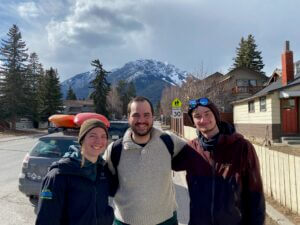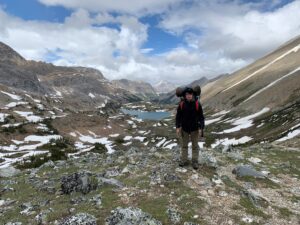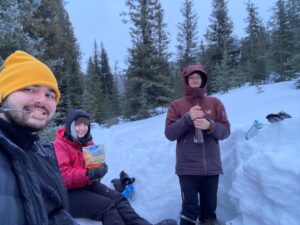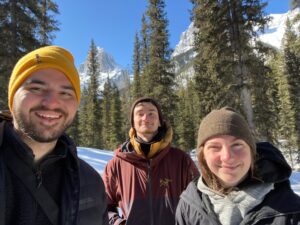Finding Redemption in the Rocky Mountains
Posted on Sunday, April 24th, 2022
Mathew Sheahan had considered it unfinished business. In the summer of 2019, he and two friends planned a 52-kilometre trek of a part of Sawbuck Trail, one of the toughest hikes in Alberta’s Rocky Mountains, but the trip didn’t turn out as they had expected. It could have been a disaster, but for Sheahan, it became a watershed moment that drove him to enrol in the Outdoor Adventure program at Algonquin College’s Pembroke Waterfront Campus.
Sheahan brought memories of that experience to Algonquin College, hoping the program would give him an opportunity for redemption. He needed to prove to himself that he could return to the Rockies, hoping to retrace his steps after learning the skills he felt he needed to manage the risks of the excursion. He set his sites on what is known as the final expedition, the culminating experience for Outdoor Adventure students at the end of their program.

(Annalee Kanwisher and Anthony Balaz joined Matt Sheahan on their final expedition in the Outdoor Adventure program, agreeing to take Sheahan back for another attempt at the Sawback Trail)
During their Final X, groups of students plan a trip anywhere in the world, putting together detailed plans that are reviewed by their faculty before the students embark on what is often a very mentally and physically challenging activity. For Sheahan, it would look much different than the trip he and his two buddies had embarked on three years earlier.
The Sawback trail is located in Banff National Park in the rugged and beautiful Sawbuck Mountain range. It is filled with picturesque vistas including many alpine lakes and three spectacular passes. It’s considered a moderate to difficult hiking trip for experienced hikers with trip advisors recommending that travelling through the passage is best to do between July and September.
Having spent two years co-leading canoe expeditions in Frontenac Park, Sheahan had accumulated some outdoor adventure skills, but they were limited and his friends were really green when it came to backpacking, one of them having never gone on a camping trip in his life. It was supposed to be a six-day trip and because it was June, the group brought along sweaters and sweatpants, just in case the nights turned a bit chilly. “Our expectations were that this trip would in fact be simple, contrary to what online reviews had said,” recalls Sheahan.
But it wasn’t simple. It could in fact have cost the three young men their lives. Given their collective camping and hiking experience, it was an ambitious undertaking. They quickly learned it was a task they were ill-prepared for, especially when they were met by frigid temperatures, swirling winds and unexpected snowfall that left them exhausted and lost. They also determined they were in an avalanche zone and none of them had any safety training to protect them from the sudden cascade of tons of snow plowing down a mountainside.
The first three days of the trip went well. Daytime temperatures were close to 20 Degrees Celcius with overnight lows of about 10 Celcius, but on day four things changed when the men were unsure of where they were. They were at the base of a valley, surrounded by mountains. “It was here that we rolled the dice and decided to head North up a high-altitude mountain pass where we would eventually find ourselves in knee-deep snow,” recalls Sheahan.

(In 2019, Matt Sheahan and two friends tackled the Sawback Trail in Canada’s Rocky Mountains. It was an experience that changed his life and led him to Algonquin College’s Outdoor Adventure program so he would be better trained for the next time he attempted the trail.)
The trip up the mountain was treacherous. The group decided to come back down the same route they had taken so they could find a place to camp for the night. They could see a storm brewing in the distance and could feel the temperatures dropping. By nighttime, it had fallen to -5 Celcius. By morning, they awakened to snow and colder temperatures.
The sudden onslaught of winter conditions left the men cold and disoriented. Their clothing was wet, their bodies sore and the dampness of the conditions bit through their skin causing them to start questioning what they had got themselves into. They soon discovered they weren’t alone.
They were happy to meet another couple who were also trying to find their way in the harsh conditions and weren’t sure what direction to go. The group reached consensus to take a well-worn trail but when it led to a cliff edge they discovered it was a trail made by animals and now they truly were lost. Even worse, the trail they made behind them was disappearing as blizzard conditions blew the snow around and the temperature fell to -15 Celcius.
The group managed to find their way back to the main Sawback Trail, but by this point, Sheahan was exhausted. He had been carrying a 100-pound food barrel on his back for days. The higher altitude made the barrel feel heavier and the tight straps wrapped around his shoulders to secure the barrel were cutting off the blood circulation in his arms. He had barely had anything to eat in the last 24 hours and the lack of calories had him feeling weak. He collapsed.
Concerned for their trip leader, Sheahan’s two friends helped him take the barrel off his back and laid him under a pine tree where the couple who had joined them provided him with a portable heat source they had brought with them to help get the blood circulating in his body. It turned out the couple both had medical backgrounds, one of them being a family physician. Had they not been there, Sheahan isn’t sure what would have become of him.
The backpackers eventually got back on track and made it to their final destination, Lake Louise, where they celebrated the completion of the trip and reflected on the experience and the mistakes they had made. It was a turning point for Sheahan who was studying geography and sociology at Carleton University in Ottawa. The experience prompted him to leave university and enroll in the Outdoor Adventure program, primarily because he knew he needed to better understand risk management because his heart told him it wouldn’t be the first time he would tackle the great outdoors.
Fast forward to the spring of 2022 and Sheahan pitched his idea to a few classmates to re-trace his tracks along the Sawback Trail. He found a couple of students who were willing to join him on the expedition, Annalee Kanwisher and Anthony Balaz, and the three started mapping out their journey, which was scheduled for April 11 to 17, meaning it would still be winter conditions in the Mountains.

(During their final expedition, the three Outdoor Adventure students kept a log of the trip that included a video that captures the challenges they faced and the toll the hiking trip took on all of them.)
Some of the trip was déjà vu for Sheahan. He and his new hiking teammates again faced wintry weather, but this time it was much colder. The mercury sometimes dipped to minus-30 Celcius. Their boots got wet, their feet blistered, they were cold and the walking was often difficult. Sheahan was again the trip leader. He knew morale had dropped the further the classmates got into the expedition.
At one point they contemplated turning back, but they persevered. By the time they exited the trail, they were exhausted but also satisfied that they had accomplished what they had set out to do. They knew they had prepared well, but also realized that the backcountry can be unpredictable and they had chosen a difficult time of the year to take on the Sawback Trail.
It was the final assignment in a two-year Outdoor Adventure program that was offered during a worldwide pandemic. Sheahan and his classmates still spent many hours learning skills in outdoor settings but spent more time than previous cohorts learning virtually. But as his post-secondary journey at Algonquin comes to a close, Sheahan is pleased he has accomplished one of his key goals-better understanding risk management in outdoor activities.
“Prior to joining this program, I would not have imaged myself climbing waterfalls, sea kayaking in windstorms or rafting down class three rapids, but having done these things now, I am confident I can lead clients through those same situations,” says Sheahan.

Matthew Sheahan is on a life-long journey. A narrow escape in some of Canada’s most rugged territory brought him to the Outdoor Adventure program and a commitment to learning helped him learn from his previous mistakes and has inspired him to continue to explore some of the most interesting places on earth. He has proven he has the spirit and the drive to be an adventurer, but now he knows his career comes with risk and he is much better prepared to face the next Sawback Trail.
He achieved what he set out to do when he enrolled in the Outdoor Adventure program, and this time he was satisfied he did things right. It wasn’t easy, but after logging 130 kilometres, far more than the group had planned, he appreciates that every adventure activity he engages in is a learning experience.
“While as a group we all agreed we wouldn’t do that route again, winter expeditions like this one are certainly going to be in my future. I really enjoyed the challenge and what it means to push my limits, whilst still understanding the risk affiliated with each venture. It was certainly a valuable skill that ODA taught me,” says Sheahan.
Canada is a vast country with a lot of backcountry. Sheahan might be just getting started as an Outdoor Adventure explorer. With each experience, he’ll continue to learn, but at least now he has a foundation to build on. He found redemption in the Rockies.
- Posted in
- Waterfront Campus Blog